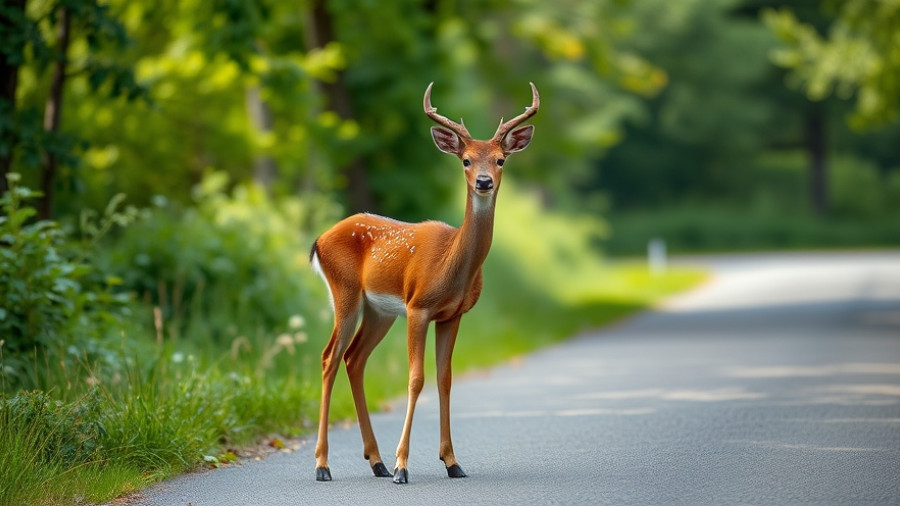
Legalizing Roadkill: A Unique Opportunity for Kansas City Residents
In recent updates by the Douglas County Sheriff’s Office, a program enables residents to salvage deer found on the roads—a practice that not only helps manage wildlife overpopulation but also provides a sustainable food source for those willing to engage. The initiative allows individuals on a 'deer list' to respond quickly to incidents, potentially transforming roadkill into nutritious meals. With over 10,600 deer-related accidents reported statewide in 2023, this practice demonstrates a creative reuse of resources, turning a nuisance into an opportunity.
In 'Douglas County Sheriff updates 'deer list' process', the discussion dives into a unique community initiative for managing local deer populations, prompting us to explore its implications further.
The Deer List Process: A Step-by-Step Guide
The process is clear and convenient. Interested residents can apply online to be placed on the deer list. Those selected must be at least 18 years old and hold a valid driver’s license. When a deer is reported on a county road, the sheriff’s department contacts the top applicant on the list. This person has 30 minutes to respond and must remove the deer as-is, ensuring it is not field-dressed at the location. Once completed, the responder receives a deer tag from the sheriff’s deputy, allowing them to claim the meat.
Community Engagement: More Than Just Meat
This initiative brings communities together, transforming a potential waste into a communal benefit. Many who participate in the deer harvesting process utilize the meat for personal consumption, while others might choose to donate their bounty to local food banks and charities. This has profound implications for food security in Kansas City neighborhoods, particularly as many residents face challenges accessing fresh meat.
Environmental Impact: Addressing Overpopulation
Deer overpopulation is not merely a local issue; it has ramifications for the ecosystem. By allowing citizens to salvage deer meat, the sheriff’s office aids in controlling deer populations responsibly. This effort bears significance, especially within the context of an increasing number of vehicle-deer collisions. With better management of deer populations, the initiative aims to protect local wildlife habitats and enhance road safety for drivers.
Making it Accessible: Updated Application Process
One of the most significant changes made is the shift to an online application process, streamlining the experience for residents. Many people find the application cumbersome when it's not technologically updated. Now, applying to become part of the deer list can be done from the comfort of home, making it more attractive for potential responders. This modernization reflects the sheriff’s department's commitment to facilitating community involvement in local wildlife management initiatives.
Voices from the Community: Reflecting on the Initiative
Community members, like Betty and Tony, have expressed their approval of the program. They recognize that road-killed deer can be a plentiful meat source, especially with some residents refrain from hunting or might be unable to engage in typical hunting practices. Betty mentions that many who participate give away their deer meat to churches and community support organizations, further enhancing community bonds.
Education and Awareness: Community Resources
It's essential to raise awareness about responsible hunting and wildlife management. The sheriff’s department encourages residents who may be unfamiliar with deer harvesting to understand the best safety practices and meat processing methods. With an initiative like this, educational resources become vital. Workshops or informational sessions on deer processing can empower locals to get more involved with sustainable practices.
Looking Ahead: Future of the Deer List Program
As more residents take interest in the deer list program, there lies the potential for integrating further sustainable practices. The sheriff's office may explore expanding this initiative to include other types of wildlife or establishing partnerships with local restaurants or charities that focus on utilizing this resource effectively. This approach could position Kansas City as a model community for innovative wildlife management while supporting local culinary culture.
Engagement with the Community: Your Role
As Kansas City residents continue to explore sustainable living options, programs like the deer list serve as a reminder of the potential that lies dormant in our ecosystems. Interested individuals can engage actively by applying for the deer list, educating themselves about deer management, or sharing their experiences with local media. The sheriff's office welcomes community stories and involvement, fostering a culture of collaboration and care for our shared environment.
 Add Row
Add Row  Add
Add 




Write A Comment